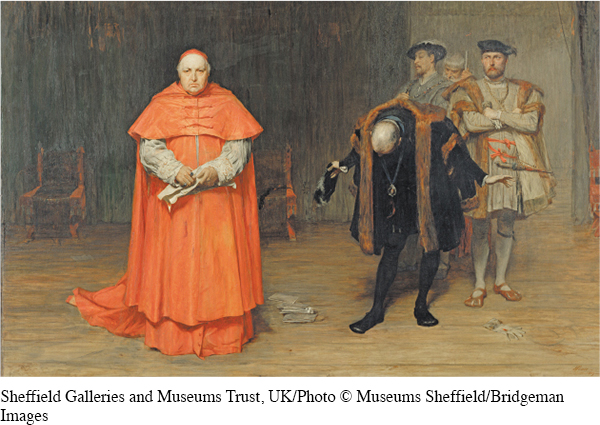from Henry VIII
William Shakespeare

William Shakespeare (1564–
KEY CONTEXT This excerpt comes from Shakespeare’s Henry VIII, a history play about the mercurial king of England from 1509 to 1547. In this soliloquy from Act 3, Scene 2, the speaker, Cardinal Wolsey, has just been dismissed as an advisor to the king. As the advisor, Wolsey had power, authority, and the king’s favor. Now he has lost everything — “goods, lands, tenements, / Castles, and whatsoever” — and is even in jeopardy of losing his life. Right before Wolsey speaks, the duke who announces Wolsey’s fate says, “So fare you well, my little good lord cardinal,” and leaves the stage.
CARDINAL WOLSEY So farewell — to the little good you bear me.
Farewell! a long farewell to all my greatness!
This is the state of man: to-
The tender leaves of hopes, to-
5 And bears his blushing honours thick upon him;
The third day comes a frost, a killing frost,
And when he thinks, good easy man, full surely
His greatness is a-
And then he falls as I do. I have ventur’d,
10 Like little wanton boys that swim on bladders,
This many summers in a sea of glory,
But far beyond my depth. My high-
At length broke under me, and now has left me,
Weary and old with service, to the mercy
15 Of a rude stream that must for ever hide me.
Vain pomp and glory of this world, I hate ye!
I feel my heart new open’d. O how wretched
Is that poor man that hangs on princes’ favors!
There is, betwixt that smile we would aspire to,
20 That sweet aspect of princes, and their ruin,
More pangs and fears than wars or women have;
And when he falls, he falls like Lucifer,
Never to hope again.


Consider this painting depicting Wolsey’s dismissal, with Wolsey on the far left while the Duke of Norfolk bows to take his leave and the Duke of Suffolk, Early of Surrey, and the Lord Chamberlain look on.
Understanding and Interpreting
Trace Wolsey’s complex response to the sudden news of his dismissal by the king.
Consider Wolsey’s assertion that “There is, betwixt that smile we would aspire to, / That sweet aspect of princes, and their ruin, / More pangs and fears than wars or women have” (ll. 19–
21). Explain what Wolsey means by this statement.
Analyzing Language, Style, and Structure
In lines 3–
9, Wolsey describes what he believes to be the condition or state of the human experience. Paraphrase his description, and then discuss how it sets up the rest of the speech. In lines 9–
15, Wolsey compares his current situation with that of boys who have swum too far in the ocean, where they risk drowning, and are kept afloat by air- filled sacs. Instead of air, what has carried Wolsey out of his depth? How does this simile effectively support his main assertion concerning his current situation? In line 16, Wolsey denounces the “vain pomp and glory of this world” and declares “I hate ye!” How does this declaration set up the conclusion of the speech and how does his allusion to Lucifer support that conclusion?
Connecting, Arguing, and Extending
Do some research about how people respond to losing their jobs and the possible reasons for their responses. Then write an essay in which you explain why the loss of a job causes great anxiety beyond the mere loss of income.
The sudden loss of power by people in high-
ranking positions is something that continues to occur in modern politics. When an individual is forced to resign from his or her position, the resignation will often be accompanied by a very public statement in which the person who is resigning expresses his or her feelings about the situation. Select an example of a recent politician who has been disgraced and forced to resign from power. Then, examine how the public speech the politician offers either attempts to explain how he or she will make up for various transgressions or attempts to explain why the dismissal is unfair. Identify the speaker’s goal, and analyze how the speaker uses language to accomplish that goal.